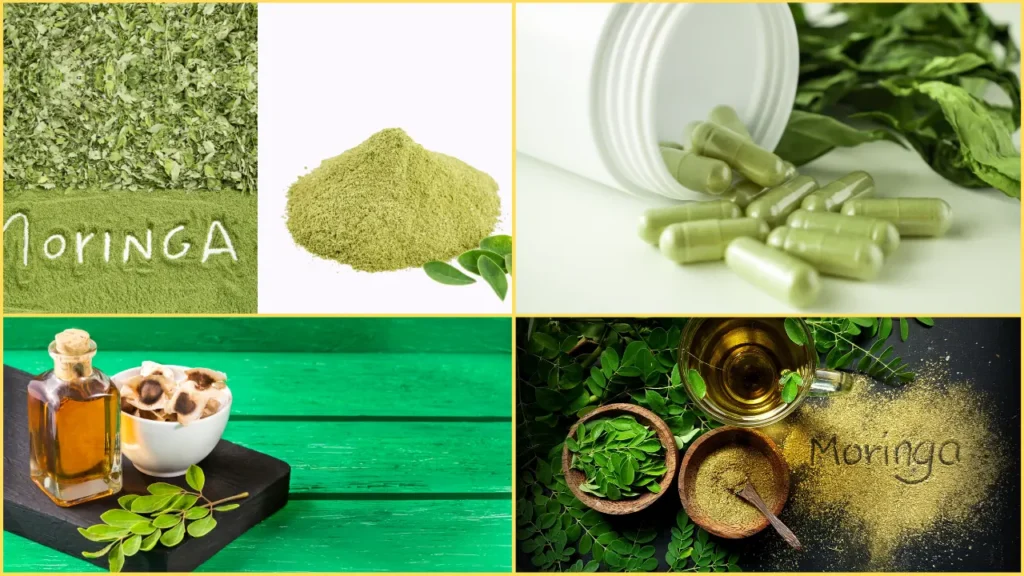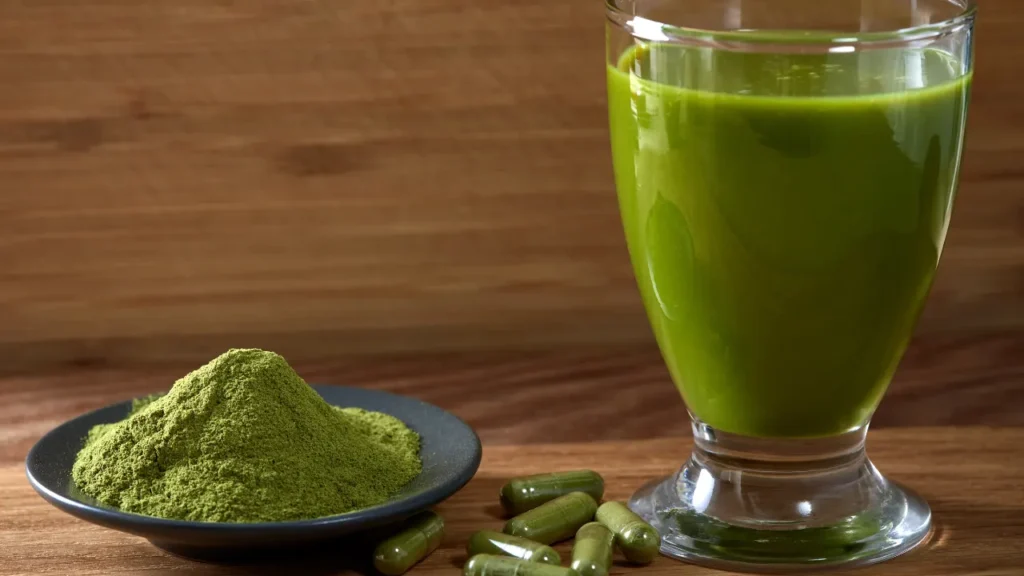The plant, Moringa oleifera is leading the way in the superfood revolution. This in-depth essay explores the moringa plant which is valued for its exceptional nutritional makeup as well as its capacity to thrive in harsh conditions. Originating on the Indian subcontinent and now widely used worldwide, moringa is unparalleled in its health advantages provided by its leaves and roots. Moringa is a remarkable source of vitamins, minerals, and antioxidants that support a multitude of health benefits, from better mental health to heightened immune function. This article also emphasizes the importance of moderation in moringa supplementation and offers helpful advice on the incorporation of this superfood into everyday life.
You May Also Like:
Moringa: Benefits, Dosage, Side Effects, Drug Interactions, and Other Important Information
What Is Moringa?
The moringa plant is native to the Indian subcontinent and grows quickly even in spite of droughts. It is a member of the Moringaceae family, of which there are thirteen known variants. Moringa oleifera is the most well-known amongst the 13 and it is one of the most researched species. This adaptable tree has a maximum height of 10–12 meters and is distinguished by its long, dangling seed pods and its delicate, slender branches and tripinnate leaves.
The plant is remarkable for its ability to be almost entirely edible and beneficial for human consumption:
- Leaves: The leaves are the most nutritious part of the plant, which is rich in vitamins A and C, and a good source of minerals and essential amino acids. They can be eaten fresh in salads, cooked like spinach, or dried and powdered for use as a dietary supplement.
- Seed Pods (Drumsticks): The seed pods are used extensively in cooking, particularly in South Asian cuisine, for their ability to enhance flavors in dishes while adding a significant nutrient boost.
- Seeds: Producing oil when pressed, moringa seeds are known for their antioxidant and skin-hydrating properties. The seeds can also be used for water purification.
- Flowers: Moringa flowers are edible when cooked and they are often used in teas that can contribute to reducing inflammation.
- Roots: The roots of the plant have a taste resembling horseradish. They are used sparingly in culinary applications due to their potent flavor and nutritional profile.
The health advantages of moringa are mentioned in ancient Indian Ayurvedic literature, which says that it can prevent over 300 ailments. It has a wide range of uses in traditional medicine, including the treatment of infectious disorders and inflammation as well as the synthesis of natural antibacterial and antifungal medications. Moringa has gained widespread attention and considerable popularity in the nutrition and food industries as a result of its recent discovery. Numerous traditional assertions about the benefits of moringa, including its ability to improve nutritional status, strengthen the immune system, and enhance general health, have been confirmed by scientific studies and hence it is undeniable that moringa is a true modern-day superfood.

Different Forms of Moringa and Their Uses
Moringa Oleifera is available in several forms to suit various preferences and uses. Each form offers unique advantages and applications, catering to a wide array of nutritional and therapeutic needs.
Powder
To maintain their high nutritional profile, moringa leaves are dried and processed into a fine powder. This form is very adaptable and simple to include in regular meals. Because of its high vitamin, mineral, and antioxidant content, moringa powder is a popular addition to smoothies, juices, and teas. It can also be sprinkled on meals to enhance the flavor of the food. Because of its extended shelf life and simplicity of storage, the powder form is especially well-liked as an affordable means of enhancing nutrition.
Capsules
Moringa powder-filled capsules are available for people seeking an easy and quick way to incorporate moringa into their diet. For people who are constantly on the road, this form is perfect for keeping a steady dosage. Taking capsules offers a hassle-free way to reap the health benefits of moringa, such as boosting energy, decreasing inflammation, and bolstering the immune system.
Tea
Tea made from moringa leaves is also packaged, either loose or in tea bags. Swigging tea made from moringa leaves contains chemicals and antioxidants that may help lower blood pressure, ease tension, and improve digestion. It can be had at any time of day and is a healthy substitute for caffeinated beverages.
Oil
Extracted from the seeds of the moringa tree, moringa oil is noted for its exceptional oxidative stability and is used in cooking, cosmetics, and skin care. Moringa oil is rich in oleic acid, vitamins, and minerals. Hence it can be applied topically for its moisturizing and rejuvenating properties, making it a valuable component in anti-aging creams, hair care products, and as a natural cleanser or moisturizer.
Fresh Leaves
One method to optimize the nutritional benefits of moringa is to consume it in its natural, fresh leaf form. Like spinach, fresh moringa leaves can be cooked in soups and other meals or consumed raw in salads and smoothies. They greatly enhance nutrition and health because they are an excellent source of calcium, potassium, vitamin C, and protein.
Each form of moringa offers a unique set of uses and benefits, making it a versatile superfood adaptable to different lifestyles and health goals. Whether incorporated into the diet as a supplement, a culinary ingredient, or a topical application, moringa’s comprehensive range of nutrients and health-promoting properties can contribute significantly to overall well-being.

Proper Dosing of Moringa
When incorporating moringa into your health regimen, understanding the recommended dosages for its various forms is crucial. Here’s a breakdown of dosing guidelines and factors influencing dosage:
Moringa Powder:
- Recommended Dosage: Typically ranges from 1 to 2 teaspoons per day for adults.
- Factors Influencing Dosage:
- Age: Children may require smaller doses, usually half of the adult dosage.
- Health Condition: Individuals with certain health conditions like diabetes or hypertension may need to consult a healthcare provider for tailored dosing recommendations.
- Purpose: Dosage may vary depending on whether moringa is used for general health maintenance or specific therapeutic purposes.
Moringa Capsules:
- Recommended Dosage: Usually 1 to 2 capsules per day, as per manufacturer instructions.
- Factors Influencing Dosage:
- Age and Weight: Children’s dosage may be adjusted based on their weight and age.
- Health Status: Those with chronic illnesses or undergoing medication should seek advice from a healthcare professional.
- Formulation Strength: Dosage may vary depending on the concentration of active ingredients in the capsules.
Moringa Tea:
- Recommended Dosage: Typically 1 to 2 cups per day.
- Factors Influencing Dosage:
- Caffeine Sensitivity: Moringa tea may contain caffeine-like compounds, so individuals sensitive to caffeine should monitor their intake.
- Individual Tolerance: Some individuals may find that they tolerate higher or lower doses of moringa tea depending on their sensitivity.
Moringa Oil:
- Recommended Dosage: For topical use, apply a small amount to the skin as needed. For internal use, consult a healthcare professional for dosage recommendations.
- Factors Influencing Dosage:
- Application Method: Topical application requires less dosage compared to internal consumption.
- Skin Sensitivity: Individuals with sensitive skin may need to start with a small amount and observe any adverse reactions.
Fresh Moringa Leaves:
- Recommended Dosage: There’s no standardized dosage for fresh leaves. Start with a small amount and gradually increase as tolerated.
- Factors Influencing Dosage:
- Preparation Method: Cooking or blending fresh moringa leaves may affect their potency and thus dosage.
- Individual Response: Pay attention to how your body responds to fresh moringa leaves and adjust the dosage accordingly.
Always consult with a healthcare provider, particularly if you’re pregnant, nursing, or have underlying health conditions before starting any new supplement regimen. Additionally, consider sourcing moringa products from reputable suppliers to ensure quality and safety.

How to Consume Moringa
As mentioned, incorporating moringa powder into your daily diet can provide a nutritional boost and enhance overall health. Here are some guidelines on how to consume moringa powder, along with recipes and ideas for daily consumption:
Smoothies:
- Recipe: Blend 1 to 2 teaspoons of moringa powder with your favorite fruits (such as bananas, berries, or mangoes), leafy greens (like spinach or kale), a source of protein (such as yogurt or protein powder), and a liquid base (such as almond milk or coconut water).
- Idea: Add moringa powder to your morning smoothie for an energizing start to your day.
Salads:
- Recipe: Sprinkle moringa powder over salads as a nutrient-rich topping. Combine mixed greens, vegetables, nuts, seeds, and a dressing of your choice, then add a pinch of moringa powder for an extra nutritional punch.
- Idea: Mix moringa powder into homemade salad dressings for a vibrant green hue and added health benefits.
Soups:
- Recipe: Stir moringa powder into soups and stews towards the end of cooking. Whether it’s a hearty vegetable soup or a creamy lentil stew, moringa powder can easily be incorporated to enhance flavor and nutrition.
- Idea: Make a nourishing broth by simmering moringa powder with vegetables, herbs, and spices for a comforting and nutritious soup base.
Breakfast Bowls:
- Recipe: Sprinkle moringa powder over oatmeal, yogurt bowls, or chia pudding for a nutritious breakfast option. Top with fruits, nuts, seeds, and a drizzle of honey for added flavor and texture.
- Idea: Mix moringa powder into pancake or waffle batter for green pancakes or waffles that are both visually appealing and nutritious.
Baked Goods:
- Recipe: Incorporate moringa powder into baked goods such as muffins, cookies, and energy bars. Replace a portion of flour with moringa powder for a boost of vitamins and antioxidants.
- Idea: Make moringa-infused energy snacks by combining moringa powder with dates, nuts, and coconut flakes, then rolling it into bite-sized snacks.
Beverages:
- Recipe: Mix moringa powder into beverages like herbal tea, lemonade, or coconut water for a refreshing and nutritious drink. Add a squeeze of lemon or a touch of honey to enhance the flavor.
- Idea: Create a moringa latte by blending moringa powder with warm milk (or a dairy-free alternative) and a dash of cinnamon for a soothing beverage.
Try a variety of recipes and serving ideas to discover tasty ways to include moringa into your regular diet. Do not forget to begin with small quantities and raise them gradually as needed. Take advantage of moringa’s health advantages while discovering new culinary possibilities!

Understanding Moringa’s Side Effects
While moringa is generally considered safe for consumption, it’s important to be aware of potential side effects and contraindications, as well as the significance of moderation in its use.
Possible Side Effects:
- Digestive Issues: Some individuals may experience gastrointestinal discomfort such as nausea, diarrhea, or stomach cramps when consuming moringa in large amounts.
- Allergic Reactions: People with allergies to plants in the Brassicaceae family (which includes cabbage, broccoli, and mustard) may experience allergic reactions to moringa.
- Interference with Medications: Moringa may interact with certain medications, particularly those for blood pressure, diabetes, or blood thinning. It’s advisable to consult with a healthcare provider before consuming moringa if you’re taking medications.
Contraindications:
- Pregnancy and Breastfeeding: While moringa is often promoted as a superfood, pregnant and breastfeeding women should exercise caution and consult with a healthcare professional before incorporating it into their diet, as there’s limited research on its safety in these populations.
- Autoimmune Diseases: When taking moringa, people with autoimmune diseases including multiple sclerosis, lupus, or rheumatoid arthritis may want to exercise caution. Compounds found in moringa have the ability to boost immunity, which could make autoimmune disease symptoms worse. Before adding moringa to their diet, people with autoimmune problems should speak with a healthcare professional.
- Kidney Disorders: Moringa contains compounds that may have diuretic properties, so individuals with kidney issues should monitor their intake and consult with a healthcare provider.
Importance of Moderation:
- Avoiding Excessive Consumption: While moringa offers numerous health benefits, consuming it excessively may lead to adverse effects. It’s essential to follow recommended dosages and not exceed the suggested intake.
- Balanced Diet: Moringa should be viewed as a supplement to a balanced diet rather than a replacement for other nutritious foods. Variety is key to obtaining all essential nutrients and minimizing the risk of side effects.
- Individual Sensitivity: Everyone’s body responds differently to dietary supplements, so it’s crucial to pay attention to how your body reacts to moringa and adjust your intake accordingly.
- Consultation with Healthcare Providers: Individuals with underlying health conditions or those taking medications should consult with a healthcare provider before incorporating moringa into their regimen. Healthcare professionals can provide personalized guidance based on individual health status and medical history.
While moringa offers numerous health benefits, it’s essential to be mindful of potential side effects and contraindications. Moderation is key to safely enjoying the advantages of moringa while minimizing the risk of adverse reactions. If you have any concerns or questions about incorporating moringa into your diet, it’s always best to seek advice from a healthcare professional.

Interactions With Medications
Moringa, hailed for its nutritional value and health benefits, may interact with certain conventional medications. Understanding these potential interactions is crucial for maintaining your health and ensuring the effectiveness of your prescribed treatments.
Blood Pressure Medications:
- Interaction: Moringa may lower blood pressure. When taken alongside medications for hypertension, it could potentiate the effects, leading to excessively low blood pressure (hypotension).
- Advice: Patients on blood pressure medications should consult their healthcare provider before using moringa. Monitoring blood pressure regularly is recommended if both are used concurrently. Adjustments to medication dosages may be necessary under medical supervision.
Diabetes Medications:
- Interaction: Moringa has been reported to lower blood sugar levels. When combined with diabetes medications such as insulin or oral hypoglycemic agents, it may enhance the hypoglycemic effects, potentially causing blood sugar levels to drop too low (hypoglycemia).
- Advice: Close monitoring of blood sugar levels is essential for individuals with diabetes and they should consult their healthcare provider before adding moringa to their regimen.
Blood-Thinning Medications (Anticoagulants):
- Interaction: Moringa contains compounds that may have anticoagulant properties, which could potentially increase the risk of bleeding when taken with blood-thinning medications like warfarin or aspirin.
- Advice: Patients taking blood-thinning medications should inform their healthcare provider before using moringa. Regular monitoring of blood clotting parameters may be necessary, and adjustments to medication dosages should be made under medical supervision.
Thyroid Medications:
- Interaction: Moringa contains compounds known as glucosinolates, which may interfere with thyroid function and the absorption of thyroid medications such as levothyroxine.
- Advice: Individuals taking thyroid medications should discuss the use of moringa with their healthcare provider.
Immunosuppressants:
- Interaction: Moringa contains bioactive compounds that may stimulate the immune system. When taken alongside immunosuppressive medications prescribed for conditions like organ transplantation or autoimmune diseases, moringa could potentially counteract the effects of these medications.
- Advice: Patients on immunosuppressants should consult their healthcare provider before using moringa. Close monitoring of immune function and adjustments to medication dosages may be necessary under medical supervision.
To summarize, consultation with your healthcare provider is essential before incorporating moringa into your regimen. You should also be very transparent with your healthcare provider and let them know about all the medications, supplements, and herbs that you are currently using. This way, they can offer personalized advice based on your current status, medical history, and medication regimen.

The Best Time to Consume Moringa
Determining the optimal time to consume moringa can maximize its benefits and support your overall health. Here are insights into when to consume moringa for maximum benefit, along with considerations for whether to take it on an empty stomach or after meals:
Firstly, the moringa supplement can be taken on an empty stomach as it can help in restoring nutritional stores and improving the immune system. Combining the supplement after your breakfast can also ensure that your body has all the necessary nutrients full of fiber, healthy fats, and proteins. This can support various physiological functions, including cell repair, muscle building, and cognitive function.
There are also people who like to take moringa leaves as a midday supplement in between meals to avoid overburdening the digestive system. This may help bridge nutrient gaps, relieve hunger, and minimize energy dips, supporting overall well-being and productivity. Additionally, some people also consume moringa before exercise because it can boost energy levels, reduce oxidative stress, and accelerate recovery, allowing for more effective workouts and better overall fitness outcomes.
Moringa can also be consumed during your evening meal. When taken with dinner, moringa can promote proper digestion and nutrient absorption while assisting in meeting your daily nutritional requirements. Consuming moringa with dinner supplies vital nutrients that can help support rest, healing of cells, and restorative sleep. Moreover, it can lessen cravings that arise late at night and help normalize blood sugar levels.
Hence, the ideal time to eat moringa ultimately relies on tolerance levels, lifestyle choices, and personal preferences. You need to find out what suits you the best and produces the desired health effects. Pay close attention to your body’s signals and modify your moringa intake accordingly. To get the most out of moringa over time, be consistent with when you take it—with meals, between meals, or on an empty stomach.
The ideal time to eat moringa will vary depending on your objectives, way of life, and taste. You may include moringa in your daily routine to support general health and well-being, whether you like to take it in the morning for a nutrient boost, with meals to help digestion, or before exercise for better performance.

Maximizing the Benefits of Moringa
To harness the full potential of moringa and maximize its benefits, it’s essential to consider how to pair it with other foods or activities and maintain a balanced diet and lifestyle. Here are some tips to help you make the most of moringa’s nutritional properties:
Moringa can be paired with fruit and vegetables, and be incorporated into smoothies, salads, or vegetable dishes. This can enhance its antioxidant properties and provide a diverse array of vitamins and minerals. Moringa can also be combined with healthy fats such as avocado, nuts, seeds, or olive oil. These healthy fats can help facilitate the absorption of fat-soluble vitamins present in moringa such as vitamins A and E. Moringa can also be paired with protein-rich foods like beans, lentils, tofu, or lean meats to support muscle repair and growth. This combination can promote satiety and muscle recovery.
All in all, it is important to embrace a balanced lifestyle while incorporating moringa into your diet. This can help maintain overall health and well-being while ensuring that the health advantages of Moringa are fully utilized.
Choosing High-Quality Moringa Products
Selecting the best moringa products is essential to ensure you receive the maximum nutritional benefits and avoid potential contaminants or inferior quality. Here’s a detailed guide on the criteria for choosing high-quality moringa products and identifying warning signs of low-quality ones:
Organic Certification:
- Look for moringa products that are certified organic by reputable organizations such as the USDA (United States Department of Agriculture) or equivalent certification bodies in your country.
- Organic certification ensures that the moringa has been grown and processed without the use of synthetic pesticides, herbicides, or chemical fertilizers, preserving its purity and nutritional integrity.
Sourcing Practices:
- Choose moringa products sourced from trusted suppliers with transparent and ethical sourcing practices.
- Opt for moringa sourced from regions known for high-quality cultivation practices and optimal growing conditions, such as tropical and subtropical regions.
- Consider moringa products sourced from small-scale farmers or cooperatives that prioritize sustainable farming methods and support local communities.
Processing Methods:
- Look for moringa products processed using gentle methods that preserve the plant’s nutritional content and bioactive compounds.
- Cold-pressing techniques are preferable for extracting moringa oil, as they retain the oil’s beneficial properties and prevent degradation from heat exposure.
- Choose moringa powder or capsules processed using low-temperature drying methods to maintain the plant’s natural enzymes, vitamins, and antioxidants.
Transparency and Lab Testing:
- Seek moringa products from companies that provide transparent information about their sourcing, processing, and quality control measures.
- Look for brands that conduct third-party lab testing to verify the purity, potency, and absence of contaminants in their moringa products.
- Check for Certificates of Analysis (COAs) or Quality Assurance (QA) reports that attest to the product’s compliance with safety and quality standards.
Packaging and Storage:
- Choose moringa products packaged in light-resistant, airtight containers to protect against oxidation and degradation of nutrients.
- Avoid moringa products sold in transparent or clear packaging, as exposure to light can diminish the potency and freshness of the product.
- Store moringa products in a cool, dry place away from direct sunlight to maintain their quality and shelf life.
Warning Signs of Low-Quality Products:
- Lack of Certification: Be wary of moringa products that lack organic certification or any form of third-party quality assurance.
- Unclear Sourcing: Avoid products with vague or undisclosed information about the origin of the moringa and the farming practices used.
- Presence of Additives: Check the ingredient list for unnecessary additives, fillers, or preservatives that may compromise the purity of the moringa product.
- Suspiciously Low Prices: Exercise caution when encountering moringa products sold at unusually low prices, as they may indicate inferior quality or adulteration.
- Foul Odor or Taste: Avoid moringa products with an unpleasant odor or bitter taste, as they may indicate poor quality or rancidity.
By following these criteria and being vigilant for warning signs, you can confidently select high-quality moringa products that deliver the nutritional benefits you seek while ensuring your safety and satisfaction.

Moringa: Conclusion:
Moringa has a scientific name of Moringa oleifera. Moringa is also known as a superfood that can help combat malnutrition due to its extremely well-balanced nutritional profile. A lot of researchers have been investigating the effects of taking moringa supplements. Thus, it is undeniable that the evidence has pointed out that moringa is an excellent supplement for the body. A few of the notable health benefits of the moringa plant are improving heart health, regulating blood sugar levels, better digestion, and being great for skin care. These effects stem from the chemical makeup of the plant which is full of vitamins, minerals, and phytochemicals. All in all, it’s advisable to consult with a healthcare professional to evaluate potential benefits, risks, and appropriate dosages based on your individual health needs.
References:
- Moringa Dosage: How to Take Moringa for Best Results. Retrieved from: https://longevity.technology/lifestyle/moringa-dosage-how-to-take-moringa-for-best-results/
- 3 Ways to Take Moringa Powder. Retrieved from: https://www.wikihow.com/Take-Moringa-Powder
- Moringa: Benefits, Side Effects And Risks. Retrieved from: https://www.forbes.com/health/nutrition/moringa/
- The Impact of Moringa oleifera Supplementation on Anemia and other Variables during Pregnancy and Breastfeeding: A Narrative Review. Retrieved from: https://www.ncbi.nlm.nih.gov/pmc/articles/PMC10301989/
- Effect of Moringa oleifera Lam. leaf powder on the pharmacokinetics of nevirapine in HIV-infected adults: a one sequence cross-over study. Retrieved from: https://aidsrestherapy.biomedcentral.com/articles/10.1186/s12981-017-0140-4
Important Note: The information contained in this article is for general informational purposes only, and should not be construed as health or medical advice, nor is it intended to diagnose, prevent, treat, or cure any disease or health condition. Before embarking on any diet, fitness regimen, or program of nutritional supplementation, it is advisable to consult your healthcare professional in order to determine its safety and probable efficacy in terms of your individual state of health.
Regarding Nutritional Supplements Or Other Non-Prescription Health Products: If any nutritional supplements or other non-prescription health products are mentioned in the foregoing article, any claims or statements made about them have not been evaluated by the U.S. Food and Drug Administration, and such nutritional supplements or other health products are not intended to diagnose, treat, cure, or prevent any disease.


